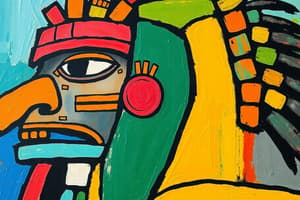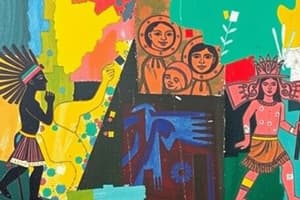Podcast
Questions and Answers
Which Mesoamerican civilization is known for its mandatory education system, regardless of social class, gender, or age?
Which Mesoamerican civilization is known for its mandatory education system, regardless of social class, gender, or age?
- Aztec (correct)
- Inca
- Mayan
- Olmec
What is the name of the traditional medicine system from ancient India?
What is the name of the traditional medicine system from ancient India?
- Kampo
- Ayurveda (correct)
- Unani
- Siddha
Who is considered the 'Father of Optics' due to his understanding of vision, optics, and light?
Who is considered the 'Father of Optics' due to his understanding of vision, optics, and light?
- Isaac Newton
- Jabir ibn Hayyan
- Galileo Galilei
- Ibn Al-Haytham (correct)
What is the name of the traditional Japanese medicine system with Chinese origins?
What is the name of the traditional Japanese medicine system with Chinese origins?
Which Mesoamerican civilization is known for its complicated calendar system?
Which Mesoamerican civilization is known for its complicated calendar system?
What is the name of the ancient Indian medical text that describes surgical and medical procedures?
What is the name of the ancient Indian medical text that describes surgical and medical procedures?
Who is considered the 'Father of Chemistry' due to his early works in alchemy and metallurgy?
Who is considered the 'Father of Chemistry' due to his early works in alchemy and metallurgy?
What is the name of the religious structures built in Indonesia from the 8th to 15th century?
What is the name of the religious structures built in Indonesia from the 8th to 15th century?
What was Ibn Sina known for in the field of Medicine?
What was Ibn Sina known for in the field of Medicine?
What is the significance of Al-Khwarizmi's contribution to algebra?
What is the significance of Al-Khwarizmi's contribution to algebra?
What was the City of Alexandria known for during the Middle Ages?
What was the City of Alexandria known for during the Middle Ages?
What is the primary role of language in human society?
What is the primary role of language in human society?
What is the significance of writing in the rise of civilizations?
What is the significance of writing in the rise of civilizations?
What is the Information Revolution associated with?
What is the Information Revolution associated with?
What is the significance of Ibn Sina's book, 'The Canon of Medicine'?
What is the significance of Ibn Sina's book, 'The Canon of Medicine'?
What is the common factor among all humans, regardless of their geographical location?
What is the common factor among all humans, regardless of their geographical location?
What is significant to the rise of modern civilization?
What is significant to the rise of modern civilization?
What is one of the goals of nations for development today?
What is one of the goals of nations for development today?
What is enabled by the use of mobile devices and the internet?
What is enabled by the use of mobile devices and the internet?
What is telecommuting?
What is telecommuting?
What is a positive impact of the Information Revolution?
What is a positive impact of the Information Revolution?
What is a negative impact of the Information Revolution?
What is a negative impact of the Information Revolution?
What is an example of a scientific revolution that changed the way people think?
What is an example of a scientific revolution that changed the way people think?
What is one of the benefits of telecommuting?
What is one of the benefits of telecommuting?
Flashcards are hidden until you start studying
Study Notes
Ancient Civilizations
- The Mayan Civilization was known for its complicated calendar system and was one of the first civilizations to have a paper-making technique and its own writing system, called Maya Hieroglyphics.
- The Inca Civilization was famous for its scientific ideas, paved roads, irrigation system, and quipu, a record system using knotted ropes.
- The Aztec Civilization was known for its mandatory education for all children, regardless of social class, gender, or age, and its chinampas, a way of farming in canals.
Indian and Indonesian Civilizations
- The Indian Civilization was known for its manufacturing of iron and metallurgical works, and its traditional system of medicine, Ayurveda, which includes the Susruta Samhita that describes different surgical and medical procedures.
- The Indonesian Civilization learned to construct Candis, religious structures with both Buddhist and Hindu heritage, from the 8th to 15th century.
Intellectual Revolution in Middle East and Africa
Ibn Al-Haytham
- Known as the "Father of Optics" due to his understanding of vision, optics, and light.
Jabir ibn Hayyan
- Known as the "Father of Chemistry" due to his early works in alchemy and metallurgy.
Ibn Sina
- Known for his works in medicine, especially in infectious diseases and pharmacology, and his books, "The Book of Healing" and "The Canon of Medicine", which were used as standard medicine texts in both the Muslim and some parts of Europe during the 17th century.
Al-Khwarizmi
- Introduced the concept of algorithms, coined "al-jabr" which means "return to original form", where algebra was rooted.
City of Alexandria
- An intellectual and scientific center during the Middle Ages.
Information Revolution
- Refers to changes in the social, economic, and political role of information.
- The generation and use of information have led to important developments in modern science.
- Affects all aspects of society, from individual lives to local and global economies and governments.
Language, Writing, and Printing
- Language is a unifying factor for humanity and differentiates humans from their evolutionary ancestors.
- Writing was important in the rise of civilizations, enabled the documentation of early events, and preserved information for future generations.
- Printing was significant to the rise of modern civilization, enabling the distribution of scientific, religious, and historical texts.
Computers, Storage, and Optical Communication
- Computers allow the processing and calculation of digital information.
- Storage devices enable the storing and sharing of information or data.
- Optical communication allows the establishment of communication networks and the internet.
Impact of Information Revolution
Politics and Government
- Increased government transparency, online campaigning, and automated elections.
Work Environment
- Enables telecommuting, allowing workers to work from home and have flexibility in their work schedule.
Impact on Society
Positive
- Made it easier for people to access information and communicate.
Negative
- Can lead to the spread of misinformation, which is dangerous for society.
Studying That Suits You
Use AI to generate personalized quizzes and flashcards to suit your learning preferences.




